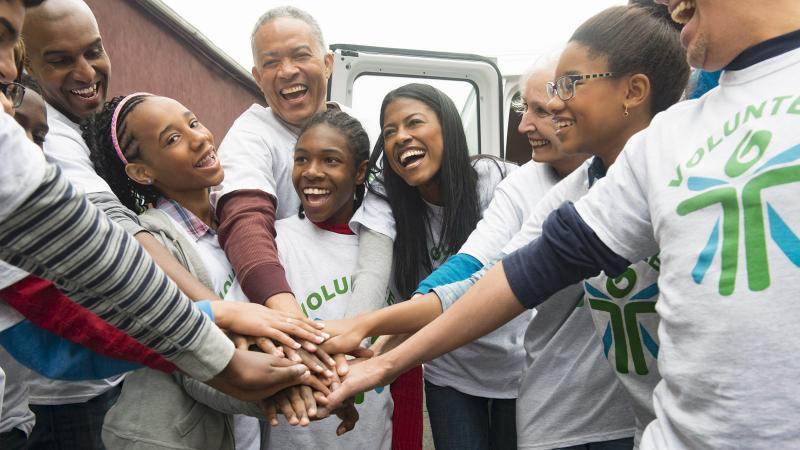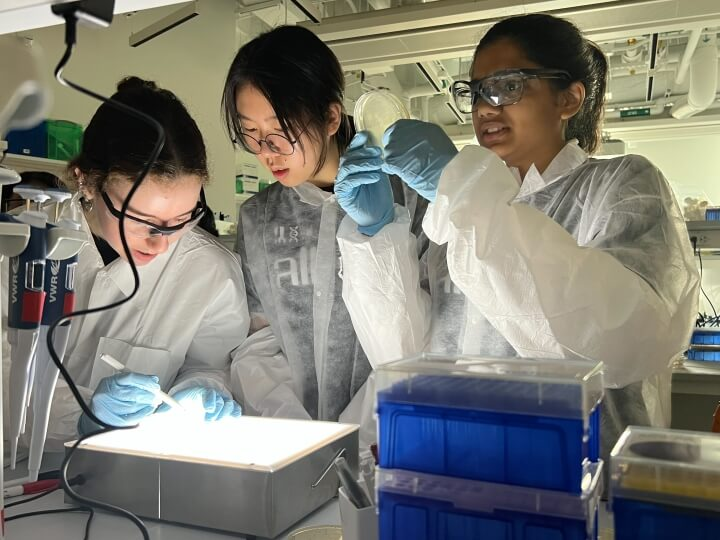
Community service projects offer invaluable opportunities for individuals to engage deeply with their local surroundings while making a meaningful impact. Programs like the Harvard SPARK initiative empower first-year students to design and execute service projects tailored to address specific community needs, showcasing the essence of community engagement initiatives. From improving public resources to advocating for underrepresented groups, these student service programs not only foster personal growth but also cultivate social responsibility. In addition, youth volunteer programs encourage collaboration among peers, inspiring a new generation dedicated to social impact projects that create positive change. By participating in community service projects, participants not only enrich their personal experiences but contribute to long-lasting transformations in their neighborhoods.
Engaging in service-oriented activities, often referred to as service-learning or civic engagement, allows individuals to connect with their communities while addressing pressing social issues. The Harvard SPARK program exemplifies this approach, as it enables new students to take initiative through various public service initiatives aimed at fostering growth and development. Such endeavors focus on nurturing community relationships and enhancing the collective well-being, emphasizing the importance of active participation and collaboration. In this context, youth-led programs or volunteer efforts serve as platforms for students to learn valuable skills while contributing to broader social impact goals. Ultimately, these experiences cultivate a profound sense of commitment to community betterment, echoing the transformative power of service.
Empowering First-Year Students through Community Service Projects
Harvard’s SPARK program is a remarkable initiative aimed at engaging first-year students in meaningful community service projects. These projects not only allow students to foster a sense of responsibility but also enhance their connection to their hometowns. With students contributing over 100 hours of service during the summer, they develop skills that will serve them well throughout their lives. The impact of these community service projects goes beyond just volunteering; they help cultivate strong relationships within the local community and inspire a generation of youth to think critically about social issues.
Through their participation in projects like community gardens, educational workshops, and mental health initiatives, SPARK fellows are empowered to make real changes in the world around them. This summer, they tackled a range of challenges that included hurricane preparedness and mental health awareness, showcasing their dedication to social impact. By involving students in these community engagement initiatives, Harvard is effectively preparing them to become future leaders in public service and social advocacy.
The Harvard SPARK Program and Its Transformation
The Harvard SPARK program has transformed the traditional summer experience for many first-year students. Participants design and execute their own community service projects, which allows them to engage with local issues that resonate on a personal level. The unique structure of the program fosters creativity and independence, as students are encouraged to leverage their skills in ways that yield tangible benefits for their communities. From improving local resources like community gardens to organizing fundraising events for inclusive organizations, the program has proven to be a fertile ground for innovation in service.
In its three years of existence, the SPARK initiative has not just been about performing community duties; it has been about initiating social change through thoughtful engagement. Students like Daniel Villani and Alphania Muthee have embraced the opportunity to address pressing public concerns, from inclusivity in sports to mental health stigma among peers. Each story of transformation resonates with a deeper message of resilience and commitment to societal betterment, making the SPARK program an invaluable part of Harvard’s overarching mission of public service.
Youth Volunteer Programs: A Catalyst for Change
Youth volunteer programs, such as those offered through the SPARK initiative, are crucial in paving the way for a more engaged and socially aware generation. By providing first-year students with opportunities to volunteer in their communities, these programs foster a sense of duty and awareness concerning local issues. Young people involved in these initiatives not only contribute their time and energy but also gain invaluable experiences that mold their future trajectories. With programs focusing on everything from mental health to environmental conservation, the impact of youth volunteering extends well beyond individual projects.
Furthermore, the diversity of projects within SPARK exemplifies the wide-ranging areas where students can make a difference. Each undertaking serves as a platform for student leaders to exercise their creativity and resourcefulness, all while addressing urgent needs in their communities. Programs focused on youth volunteerism help bridge gaps in community services and provide much-needed support in areas like education, health, and welfare. As young people engage in these initiatives, they embody the values of empathy, responsibility, and proactive leadership that are essential for a better society.
Social Impact Projects: Building Resilience in Communities
Social impact projects serve as a crucial vehicle for addressing systemic challenges faced by communities. Initiatives like those organized by students in the SPARK program demonstrate how targeted action can create significant change in social dynamics. Projects that focus on mental health awareness, poverty alleviation, and education reform not only uplift individuals but also build resilience within communities. By tackling these issues head-on, students are empowered to become catalysts for social transformation, paving the way for a future where equity and opportunity are available to all.
Organizations such as MasterPeace Colombia and Shamiri Institute illustrate how social impact projects can harness the energy and creativity of youth to effect real change. These initiatives not only focus on immediate needs, such as providing mental health resources but aim to shift long-term attitudes in society. By involving young leaders in the implementation of these projects, programs foster an environment where community members come together to support one another, creating networks of solidarity and mutual aid that are essential for enduring progress.
The Importance of Community Engagement Initiatives
Community engagement initiatives are vital in fostering a sense of belonging and responsibility among young individuals. Programs like Harvard’s SPARK provide students with the tools and support necessary to actively participate in their communities. Engaging the youth in meaningful dialogue and service allows them to address pressing social issues while also emphasizing the significance of giving back. These initiatives encourage personal growth and leadership, teaching the importance of civic responsibility that continues long past their college years.
Moreover, community engagement initiatives cultivate partnerships between local organizations and students, resulting in a richer exchange of ideas and resources. As students collaborate with community leaders and stakeholders, they gain insights into the unique challenges faced by their neighborhoods. The projects undertaken reinforce the value of collaboration and empower participants to take ownership of their contributions to society. This symbiotic relationship between students and local organizations fosters a culture of support, resilience, and innovation crucial for community advancement.
Challenges and Triumphs in Service Projects
Engaging in community service projects often comes with its own set of challenges and triumphs. Students in SPARK, like rooftop gardeners and mental health advocates, have had to navigate difficulties such as limited resources, outreach barriers, and the lingering effects of the pandemic. For instance, many projects were adapted to meet the changing needs of their communities, requiring students to remain flexible and resourceful. Overcoming these challenges can provide deep learning experiences, enabling students to develop critical problem-solving skills while working towards a common goal.
Triumph in these service projects can arise both from overcoming challenges and from witnessing the positive impacts of their efforts. Students often find joy and motivation from the stories of those they affect positively, seeing firsthand how their work contributes to improving the lives of others. Recognizing the tangible effects of their service efforts can be incredibly fulfilling, reinforcing their commitment to social advocacy. As they share their experiences, these students become ambassadors for activism, inspiring others to join in addressing community needs.
Building Inclusion Through Service
Inclusion is an essential value embedded in community service projects, particularly within programs like SPARK. The diverse backgrounds and experiences of participants create opportunities for rich interpersonal exchanges, fostering an environment where everyone feels valued. Projects that focus on creating inclusive spaces, such as those led by Daniel Villani at Rochester Community Inclusive Rowing, exemplify the importance of accessibility and adaptive resources. By advocating for those who may face discrimination or barriers, students are helping to build a more equitable society.
These service-oriented efforts play a significant role in promoting awareness about marginalized communities and their unique challenges. As students lead workshops and campaigns, they educate their peers and communities on issues related to identity, disability, and socioeconomic status. Raising awareness helps dismantle stigmas while encouraging empathy and understanding, pivotal qualities for future leaders. By prioritizing inclusion within their programs, students create a ripple effect that can change mindsets across generations, reinforcing the importance of diversity in community building.
The Ripple Effect of Volunteerism
The ripple effect of volunteerism stretches far beyond the confines of individual projects, influencing entire communities and instilling a culture of giving. Students engaged in community service projects as part of SPARK not only contribute positively to their neighborhoods but also encourage their peers to participate in similar initiatives. The relationships and networks formed through volunteerism often lead to more opportunities for collaboration, resource-sharing, and collective support, creating a robust volunteer ecosystem.
As participants share their experiences and successes from their service projects, they inspire those around them to take action. The stories of young leaders like Katherine Cassese and Alejandro Escobar become catalysts for change, demonstrating that small actions can lead to significant impacts over time. This social capital built through community service nurtures a spirit of cooperation and reinforces the importance of local engagement, ultimately leading to the development of stronger, more resilient, and interconnected communities.
Frequently Asked Questions
What are community service projects and how can they benefit students?
Community service projects are initiatives that allow students to engage with their local communities, improving societal conditions while gaining valuable skills. Programs like the SPARK initiative at Harvard encourage students to design and implement projects that address community needs—benefiting both the service recipients and the students involved through personal growth and enhanced employability.
How does the Harvard SPARK program enhance community engagement initiatives?
The Harvard SPARK program enhances community engagement initiatives by enabling students to create and execute projects that make a direct impact in their hometowns. By participating in this student service program, participants learn essential collaboration and leadership skills, while also promoting social responsibility through hands-on experiences.
What types of student service programs are commonly available?
Common student service programs include youth volunteer programs, internships with local nonprofits, and community engagement projects like those offered by Harvard SPARK. These programs typically focus on education, environmental sustainability, mental health, and social justice, providing students an opportunity to contribute positively to their communities.
How can youth volunteer programs influence social impact projects?
Youth volunteer programs can significantly influence social impact projects by fostering a sense of community responsibility among young people. They empower students to identify local issues, develop practical solutions, and implement initiatives—like those in the SPARK program—that address community needs while building leadership and advocacy skills.
What challenges do community service projects face during the pandemic?
Community service projects face several challenges during the pandemic, including reduced volunteer participation, social distancing requirements, and increased demand for services. The Harvard SPARK program participants have adapted to these challenges by implementing virtual workshops and campaigns to maintain their community engagement initiatives.
How can students participate in community service through high school programs?
Students can participate in community service through high school programs by joining student-led organizations, enrolling in volunteer programs, or starting community service projects like those in the SPARK initiative. Many schools offer platforms for students to initiate projects that address local needs, encouraging hands-on learning and community impact.
What outcomes can be expected from engaging in community service projects?
Engaging in community service projects can lead to numerous positive outcomes, including enhanced personal development, improved teamwork skills, and a greater understanding of societal issues. Projects like those in the SPARK program also provide tangible benefits to the community, such as increased awareness and action on critical issues.
What skills do students develop through involvement in community engagement initiatives?
Through involvement in community engagement initiatives, students develop a variety of skills, including leadership, project management, effective communication, and problem-solving. Programs like the Harvard SPARK initiative offer structured support, helping students navigate the challenges of planning and executing impactful social projects.
Why is community service important for students today?
Community service is crucial for students today as it cultivates empathy, social awareness, and civic responsibility. Engaging in community service projects prepares students for future careers by providing practical experience and skills that employers value, as demonstrated by programs like Harvard SPARK.
How do community service projects address social issues effectively?
Community service projects address social issues effectively by directly engaging with local needs and creating targeted initiatives. Programs like SPARK empower students to research, implement, and evaluate their projects, ensuring their efforts yield meaningful social change that resonates with those they aim to help.
What lasting impacts can community service projects have on local communities?
Community service projects can have lasting impacts on local communities by fostering a culture of giving, improving access to resources, and addressing social inequities. Initiatives driven by students through programs like Harvard’s SPARK can leave a legacy of support and sustainability that benefits future generations.
| Participant | Location | Project Description | Impact |
|---|---|---|---|
| Daniel Villani | Rochester, New York | Developed materials for a fundraising campaign for Rochester Community Inclusive Rowing (RCIR). | Increased participation opportunities for people with disabilities in rowing. |
Summary
Community service projects play a vital role in fostering growth and resilience among individuals and communities. The SPARK program allows first-year Harvard students to engage in meaningful service projects that address local needs, empowering them to create positive change. Through diverse initiatives ranging from mental health awareness in Kenya to improving accessibility in rowing for those with disabilities in Rochester, participants exemplify the transformative power of community service. The personal growth these students experience while serving their communities highlights the importance of continued involvement in community service projects, which not only benefit those served but enrich the volunteers’ lives as well.







